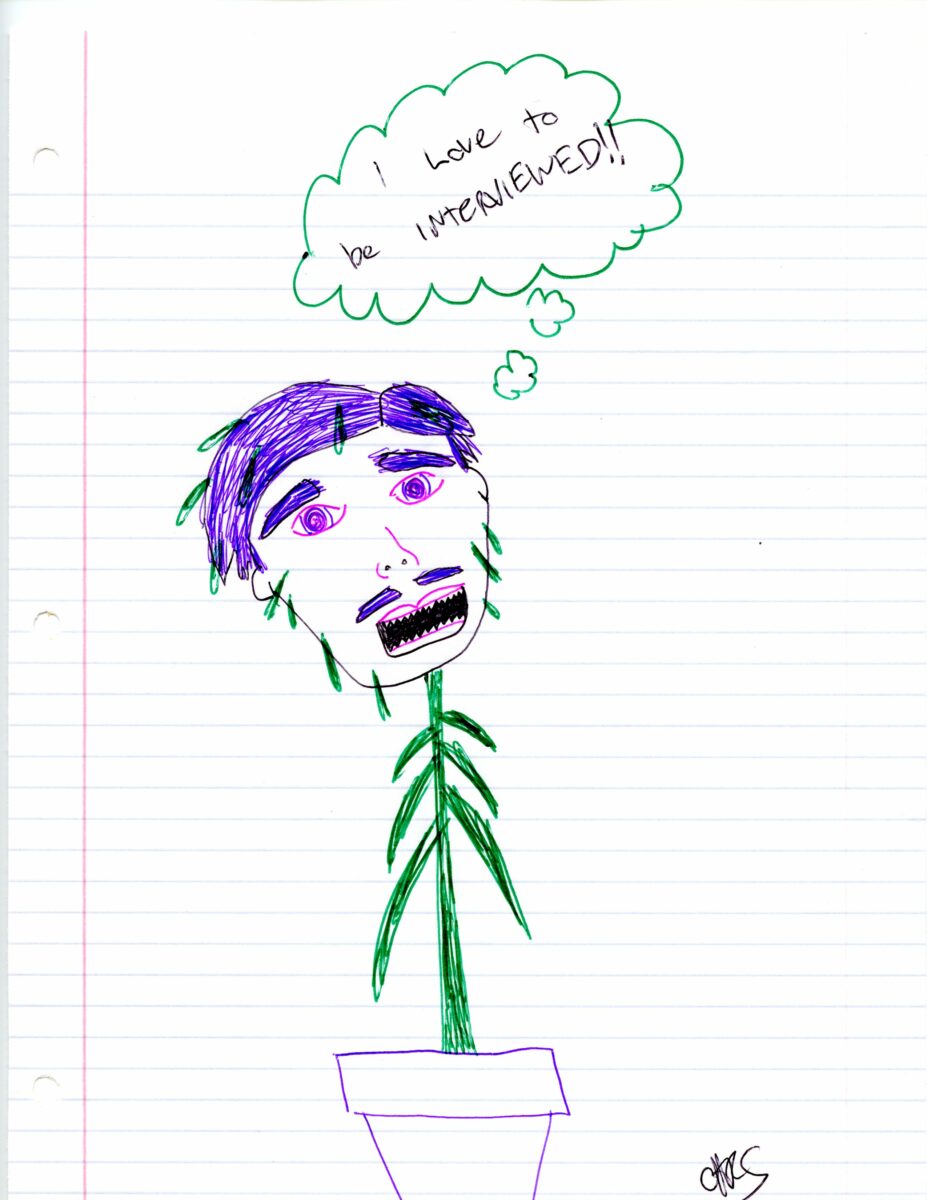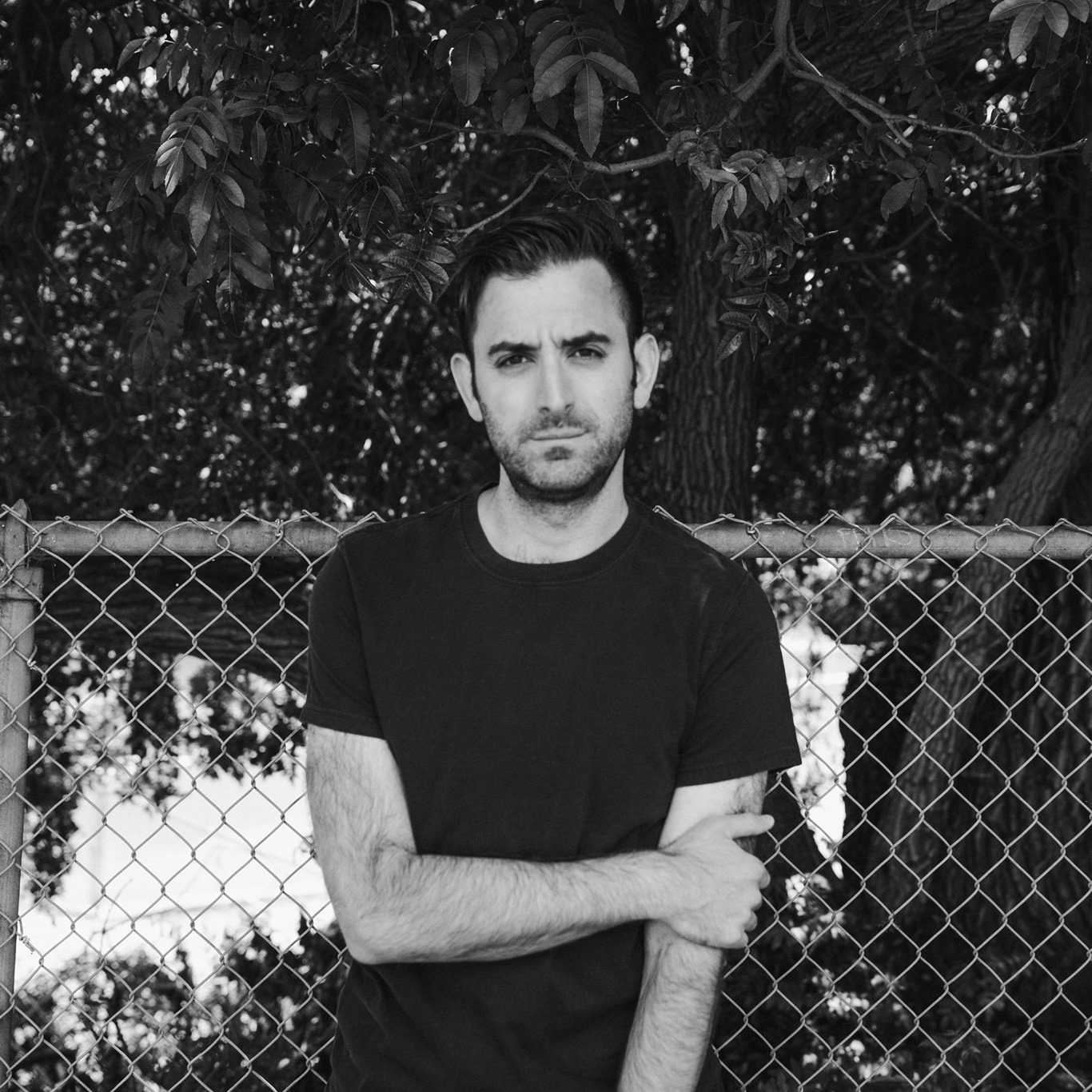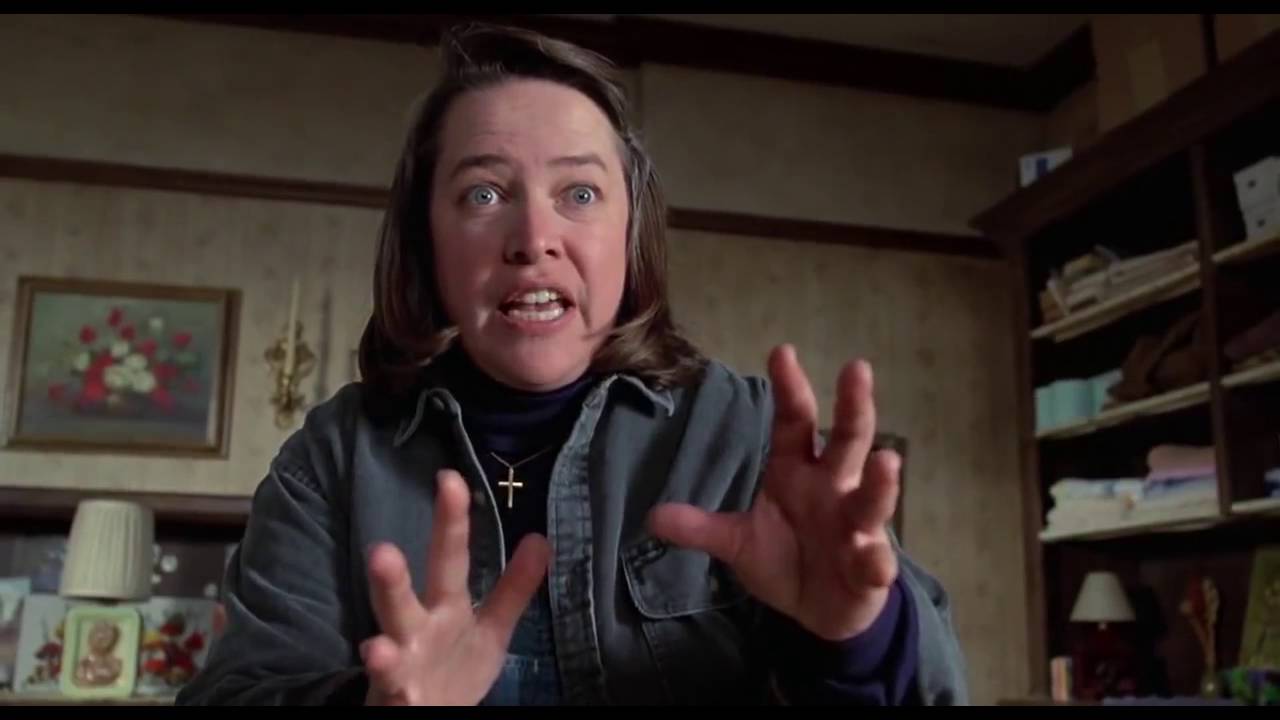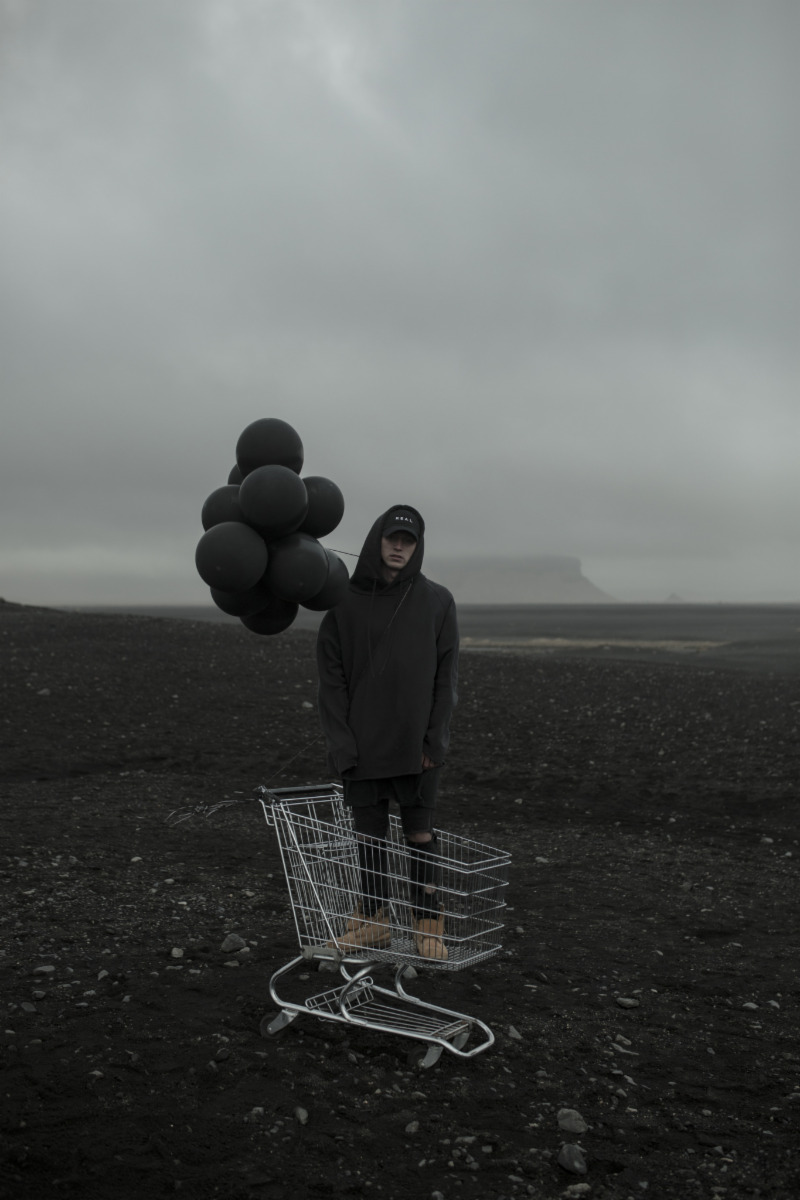Yes, you read that right: Chris Farren – once the frontman of Fake Problems, a current member of Antarctigo Vespucci and an outstanding solo artist – is not only a legendary internet personality and talented musician; he was Born Hot.
Or, you know, at least that’s what he’s named his new album, which comes out this Friday (October 11) on Polyvinyl Record Co. But really, is this the first you’re hearing of Born Hot? After blatantly teasing the phrase earlier this year, this summer Chris Farren officially announced the album title and cover with a billboard in Los Angeles. He and his wife made the move to LA from Naples, Florida, three years ago; they’d both recently turned 30 and were finally ready for new opportunities. Naples is “kind of a retirement community” that doesn’t have much in the way of opportunities for touring and recording musicians, while “there’s so many different niches you can satisfy in LA. There’s so many different scenes, so I’ve been able to find my people.”
What exactly does it mean to be “born hot”? Album titles always “just come to me,” Farren explains, and not unlike his 2016 album Can’t Die, the phrase “Born Hot” is incredibly overconfident – and very absurd. The record, however, sees Farren being incredibly self-deprecating and vulnerable and insecure, opening up about depression, grief, and lost friendships. “That’s why it’s so funny to me,” he shares. “The idea of being so confident is hilarious to me, because I don’t feel like that, so it’s just such an absurd thing to imagine, having that kind of attitude.”
For the most part, people who are into Chris Farren’s music understand that his overly confident attitude is tongue-in-cheek. Sometimes people will take it at face value – but they don’t stick around. Inherent to punk, underground, and alternative music in all its forms is a sense of wanting community, wanting to find the people – and musicians – who understand you and who get what you have to say. “I’m interested in people who will get the joke,” he remarks. “Maybe this is a weird, elitist thing to say, but if you don’t get the joke, then that’s fine, you can find somebody else to listen to.”
Our conversation switches to humor, and Farren mentions that Netflix’s I Think You Should Leave is “like, the funniest show.” Aside from that, his friends on the recent Free Throw headlining tour (Macseal, Youth Fountain) keep making him laugh. Being on the road for six weeks straight allowed him to get in the groove with playing shows – and learn the quirks and habits of some of his tour mates. Everyone in Macseal is “super funny”; when the tour stopped in Asbury Park, New Jersey, one of the band members was walking through a part of the venue they weren’t allowed to be in. “I was like, ‘you’re not allowed to be in there’ and he was just like, ‘I don’t care, I’m a bad boy,’ and that made me laugh really hard. Stuff like that is very funny to me – very low-stakes rebellion is very funny to me.” The things that he finds humorous tend to have no real victim. While higher-stakes rebellion usually has a reason behind it – and may result in some damage done – lower-stakes rebellion typically offers no harm and is often just done because it’ll make someone laugh.
The song titles on Born Hot offer playful misspellings and text-speak. Titles like “Search 4 Me” and “R U Still There” are an homage to Prince, whose songs included “I Would Die 4 U” and “U Got The Look.” Album opener “Bizzy,” on the other hand, was initially called “Dizzy”; when it came time to record vocals, Farren accidentally said “busy.” You wouldn’t be wrong to look at such titles and think, “this is sure to be a very fun and happy record!”, and many of the songs sound upbeat, too.
Take “Does The Good Outweigh The Bad?”. With a sing-song melody, it feels peppy and a bit goofy, but read the lyrics (“I heard it from a mutual that this is not unusual./I’ll come to your funeral to kick your stupid ass.”), and you’ll find a painful story about a friendship on the brink of collapse. Creating something that has such a dichotomy between the way it sounds and the words is “one of my favorite things about making music.” If you were to read the lyrics for Born Hot before you heard the record, you’d think “this is gonna be really sad,” and the music might surprise you. “I think that’s funny!”, Farren remarks. “And… it’s hard to say I do it on purpose because I’m just making the type of music that I want to make, it just kind of happens like that.”
The overconfident part of Chris Farren – the one who Can’t Die, and now the one who was Born Hot – is therefore not a “persona” so much as what he’s compelled to do. The music he writes is an expression of what’s going on in his life; he’ll often touch on friendships and relationships, writing about “knowing when it’s time to let go of a friendship or how hard do you fight for a friendship until you decide that it’s not worth it anymore.” This can also be heard on “Surrender,” where he mourns a lost friendship (“Oh, there’s something that I need to tell you, but I’m afraid to talk to you again”). When I ask why he writes so much about friendships, when so many songs focus on romantic relationships, he explains that while he does have songs about his wife on all of his records, “the things that compel me to write are often the tumultuous aspects of my life or things that are happening, and my wife doesn’t really offer me much… tumult, you know? We have a pretty great relationship, so I’m very lucky in that.” Often, he’ll have a conflict with a friend or in a music business relationship on his mind, and will then spin it into something that feels true to his situation but also leaves a few holes to keep it open to interpretation. This means that a lot of his songs sound just like they could be about a romantic relationship – even though they’re not.
Although Farren writes from personal experience, he hopes that people listening can get something out of it. It’s a mutually beneficial situation when he meets people who connect with his music, because “they’re telling me, ‘I didn’t think anybody else felt this way,’ and when they tell me that, I’m like, ‘hey, I’m the same!’ So – yeah, we’re right there with each other.” He cites Bright Eyes, Cursive, Rilo Kiley, Tegan and Sara, and The Magnetic Fields as his “roots” – the artists that made him want to start making music and “making songs that other people might listen to.” While relatability is big, Farren feels that it’s important not to overthink about other people’s reactions, because the fear “can kind of stall out your creativity – so I mostly just try to be as true to myself and what I’m feeling as possible.” He’s found that putting very specific details in songs don’t make it less relatable – and in fact, can make situations feel more human and real. “R U Still There?” is about Farren’s father-in-law passing away – he tells me that “there’s so many super specific things [in the song], but the people that I’ve played it for or the people that have heard it so far, who have gone through similar situations, say that it’s really resonated with them or it’s meant a lot.”
The cover art for Born Hot is a crudely-drawn self-portrait of a shirtless Chris Farren lying on his side, with one leg bent. He knew the cover would feature an image of him in that pose, but the idea of a photograph felt “tonally, just slightly off.” Doodling and painting came to him in the process of making the record; recording mostly alone left him “so anxious; it felt impossible to decompress every day…. At a certain point, I had fully convinced myself that I was making the worst record of my career.” Though his head went to dark, insecure places, he knew he had to finish the record (“The record label already paid for it, I just have to do it!”) – and started drawing to turn his brain off at the end of the day. The album cover came “kind of by accident,” and the resulting image nails the tone that he was going for.
On stage, Farren’s set is interactive; he’ll record and play loops as he goes, and incorporate visual elements, too. Discussing how his live sets come to fruition, he explains that he’s always listened to music that has electronic elements but had been terrified to try it himself because of the large margin for error. When he started touring solo, he was playing acoustic. Very quickly, this felt “very bored and boring. I felt like I couldn’t really entertain the way I wanted to.” So, Farren turned to Google and YouTube to learn how to use backing tracks; still, something was missing. “The benefit of a band is that there’s four or five different people to look at the whole time, so you can keep your eyes busy,” he reflects, “and I was like, ‘It’s boring to just look at me this whole time, no matter how dazzling I think I can be.'” Wanting to add a visual element, he added string lights and eventually got a projector and began playing around with video synthesizes – but he admits that “I’m not that person, I don’t know how to do that, I just had to figure it out cuz I wanted my show to be like that.”
Born Hot in Philly with another perfect set from our best friend, @chrisfarren 🔥 pic.twitter.com/eiLdQ3ejcn
— The Syndicate (@thesyndotcom) September 19, 2019
Included in his set on the Free Throw tour was a slideshow of sorts, which displayed slides saying things like “Another perfect set” (anyone who’s seen Chris Farren before knows he only always plays perfect sets), “GUITAR SOLO”, and – importantly – a slide summarizing the set: “I did a good job on stage, I seem actually really cool, You loved it, You love me.”

Chris Farren made this doodle for me.
When I ask Chris Farren to summarize this perfect interview, he’s confident (genuinely so) in saying he did great (I agreed). Though he was drawing the whole time, the conversation was fully engaged, and he scores his answers a “7.9. Not bad, maybe an 8″ (I gave him an 8.2, which he eagerly accepted). Rounding his answer up to a solid 8.7, he reiterates the upcoming release of Born Hot and mentions an upcoming headlining tour, which will happen in early 2020.
For more on Chris Farren and to see dates for the headlining tour, check out www.ChrisFarren.com, or follow him @ChrisFarren on socials.













